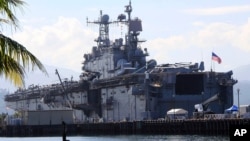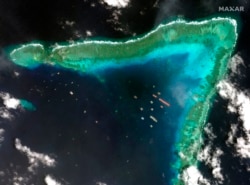Comments by Philippine officials indicate that, with a growing Chinese maritime threat, Manila now hopes the Visiting Forces Agreement with the United States - which the Philippines once moved to terminate - survives, experts told VOA Thursday.
Philippine Foreign Affairs Secretary Teodoro Locsin Jr. last year announced the country had suspended the announced termination of the agreement. The 1999 pact provides for arms sales, intelligence exchanges and discussions on military cooperation. It allows U.S. troops access to Philippine soil for military exercises aimed at regional security and local humanitarian work. Those measures shore up a 1951 Mutual Defense Treaty.
Locsin said in a tweet earlier this month that negotiations over the pact were nearly finished, Philippine media reported last week. The talks began in February and coincided with China’s mooring of 220 fishing boats at a reef that Beijing and Manila dispute. Media reports quote Locsin saying the talks should be done within the coming week.
On April 10, U.S. Defense Secretary Lloyd Austin spoke with Philippine counterpart Delfin Lorenzana, and they “affirmed the value” of the agreement, the U.S. Defense Department says on its website.
Philippine President Rodrigo Duterte, a skeptic of the United States who announced the deal’s termination in February 2020, said on national TV just over two months ago he wanted to hear public opinion on the topic. Many lawmakers have already opposed the pact's termination -- which has been suspended twice.
Saving the deal
Philippine officials have not said negotiations would save the agreement, but specialists say they believe comments from Manila show officials hope it holds up.
“There’s an emerging consensus within the key agencies, and I think something that we can see in terms of public opinion as well,” said Herman Kraft, a political science professor at University of the Philippines at Diliman, pointing to comments by defense and foreign ministry officials.
The Philippine government now wants the agreement updated to spell out explicitly that the United States would intervene to help defend outlying islands where Chinese vessels are most likely to appear, an academic close to Philippine defense officials said.
The United States had governed the Philippines for more than five decades before allowing its independence after World War II. For Washington today, the Philippines represents one in a chain of Western Pacific allies that can work together to check Chinese maritime expansion. Former U.S. defense secretary Mark Esper had called the deal cancellation a "move in the wrong direction for the longstanding relationship we’ve had with the Philippines" in part because of the Asian archipelago's location.
“Rather than maintain strategic ambiguity -- this was the practice in the past -- [Philippine officials] prefer some strategic clarity," said Eduardo Araral, associate professor at the National University of Singapore's public policy school.
Sino-Philippine maritime dispute
China and the Philippines dispute sovereignty over tracts of the South China Sea.
Their dispute eased in 2016 after Manila won a world arbitral court ruling against Beijing and Duterte pursued a new friendship with China. However, Philippine officials grew alarmed when about 100 Chinese boats showed up in 2019 near a Philippine-held islet in the sea and again when the fleet of 220 stopped at Whitsun Reef last month.
Ongoing “tension with China” gives the Philippine government a new incentive to keep the Visiting Forces Agreement, said Aaron Rabena, research fellow at the Asia-Pacific Pathways to Progress Foundation in Metro Manila.
China, which maintains Asia’s strongest armed forces, cites historic documents to support its claim to about 90% of the disputed sea. Four other governments call all or part of the same sea their own. China has alarmed many over the past decade by landfilling islets for military installations.
Smaller claimants welcome a U.S. role in the dispute, and the United States -- China's superpower rival -- doubled the number of warship passages through the sea in 2019 compared to 2018.
Delicate decision
A decision in Manila to uphold the agreement would upset China, which could in turn increase its boat count in the disputed sea, Kraft said. It could go as far as banning Philippine fishing operations, he said. The sea is valued for fisheries as well as undersea fuel reserves.
However, Duterte risks being seen as weak at home if he reinstates the U.S. pact after thundering against it in February 2020, experts say. Duterte, a long-time anti-U.S. firebrand, ordered an end to the deal after the U.S. government canceled a visa for a Philippine senator and former police chief who was instrumental in a deadly anti-drug campaign that generated outrage abroad.
Duterte might end up letting his foreign affairs and defense secretaries handle the whole Visiting Forces Agreement process, Kraft said. The Philippines could technically keep suspending its cancelation of the deal every six months until deciding what to do, Araral said.
The government could extend the review process into mid-2022, when Duterte must step down due to term limits, Rabena said.
“He doesn’t have to say yes to it,” Rabena said. “What he does sometimes is that he just allows his cabinet members to do their thing.”










